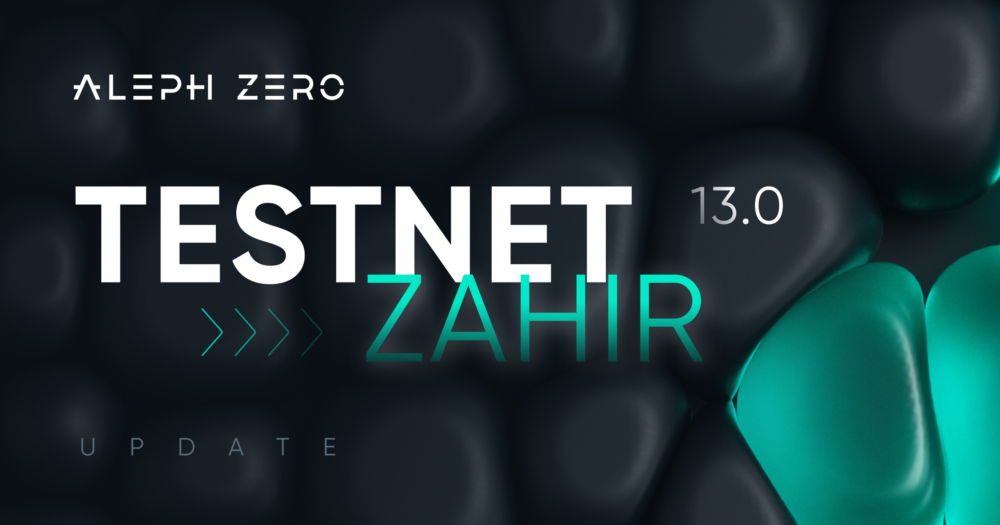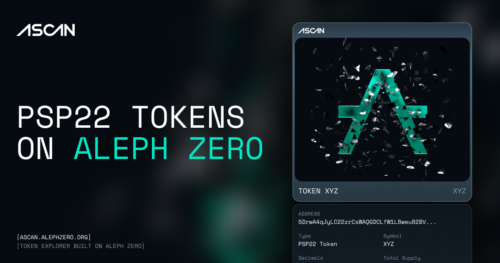Saving validator disk space, proxy accounts for higher security–here’s what’s new in Testnet 13.0 Zahir
Feb 22, 2024

A major release has landed on the Testnet, ready for testing before it will be implemented on the Mainnet. As with every chain-related update, after several weeks of successful operations on the Testnet, this set of updates will come to the Aleph Zero Mainnet.
Let’s get into the details of the release–and what the idea behind the updated codename, Zahir, is.
Validator Pruning
One of the major changes in Testnet 13.0 Zahir is enabling pruning for validator nodes. This feature saves disk space for validators, allowing them to run setups with smaller disks as the network evolves and continues to operate, putting transactions into new blocks every second.
Proxy Pallet
A new parallel proxy mechanism has been introduced to the chain, creating a new way of interacting with it.
This feature replaces controller accounts that were so far used for staking and expands on their functionality. From now on, users can set up proxy accounts to act on behalf of the main/stash account. Proxy pallet is also available to developers.
How it works?
You can set up a set of permissions for the proxy account and use it to interact with the chain while keeping the main account offline. This significantly improves account security as you can keep larger amounts in cold storage and keep the use of its seed phrase to a minimum. Proxy accounts can perform multiple actions–from staking to making transactions and interacting with smart contracts and if, for whatever reason, the seed phrase associated with it gets compromised–you can always revoke the access.
The proxy pallet can already be tested on Testnet 13.0 Zahir and will come to the Mainnet in the next release.
New Sync Mechanism
To further improve the chain’s performance, Zahir introduces a new sync mechanism to the chain. Sync is a network-based mechanism for staying up to date with the blockchain. Now, its implementation is specific to AlephBFT, improving the performance and compatibility with our consensus.
As part of the release, we have updated:
- Periodic requests;
- The ability to remove legacy block requests;
- Forest memory limitations;
- And a new metrics system to monitor performance.
New version of AlephBFT
Testnet 13.0 Zahir brings a new version of the AlephBFT consensus model, mainly to ensure better resilience to potential crashes. Minor code refactoring has also been performed.
Breaking API Changes and upgraded Substrate dependencies
It’s important to note that Zahir comes with breaking changes to the API, so if you’re using one of the features below, make sure to update your requests.
The full list of breaking changes can be found in Release Notes.
Furthermore, Substrate dependencies (including all pallets) have been upgraded from Polkadot v1.0.0 to Polkadot v1.2.0
Explaining the New Naming System
Finally, going forward, each release will be accompanied by a codename alongside the release tag. Firstly, we’ve decided to pay homage to Jorge Luis Borges, one of the great literary figures of the twentieth century. Inspired by his collection of short stories and the famous work titled “The Aleph.” Expect to see many references to his work in the coming updates!
Validators, Now It’s Your Turn!
This release features a non-backward-compatible update of the AlephBFT protocol. The Testnet network is scheduled to be switched to a new version of the protocol on 29.02.2024 at 10:00 AM CET. All validator nodes must be updated before that time to av. The ones who do not update will stop operating and crash, although the network will keep operating as usual.
We ask all Testnet validators to update their nodes as soon as possible. The update procedure is similar as usual: `aleph-node-runner` users need to just run the `run_node.sh` script (there’s no need to stop the container anymore), and users building from source should switch to the `r-13.0` tag in the `aleph-node` repository.
For more details about performing a no-downtime upgrade when building from source, please refer to the documentation.
Head over to the Validator-related channels on Aleph Zero Discord for support and more information!
Thank you for your continuous support, and stay tuned for the next development updates!


